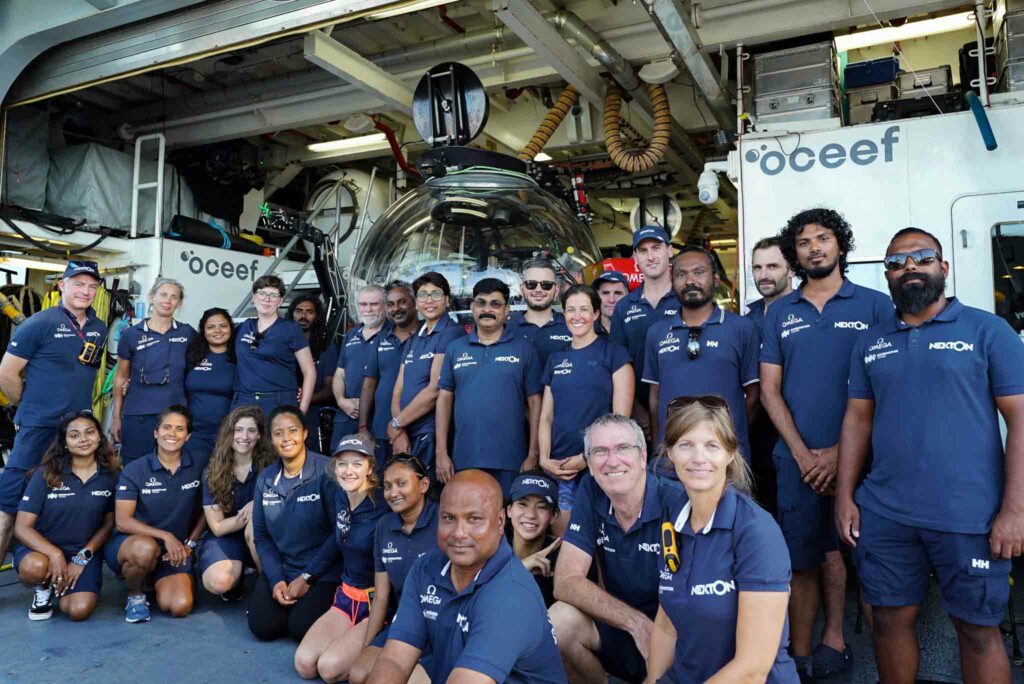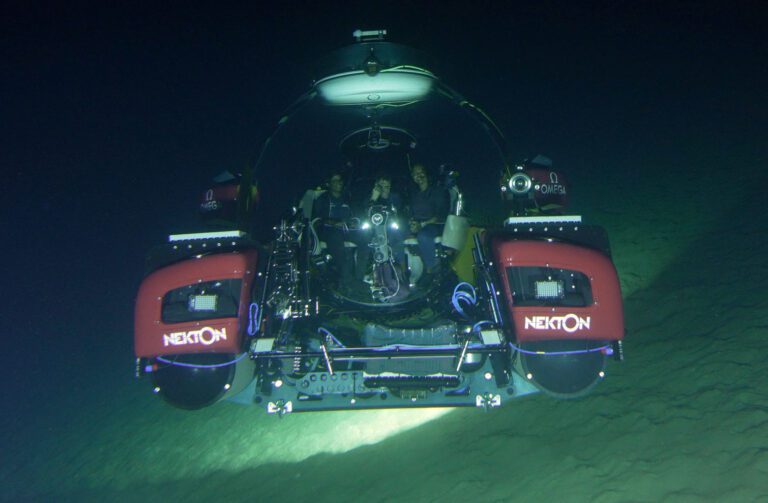Scientists on the recently completed Nekton Maldives Mission believe they have discovered a previously undescribed ecosystem at a depth of 500m – and have given it the name “the Trapping Zone”.
Video evidence from Nekton cameras aboard the submersible Omega Seamaster II, combined with biological samples and sonar-mapping, point to sharks and other large predators feeding on swarms of trapped “micro-nekton” in the newly identified zone.
Also read: Ocean Census targets 100k unknown marine species
Similar effects have been observed previously around biodiversity hotspots such as seamounts – but not around oceanic islands like the Maldives.
Micro-organisms usually migrate vertically from the deep sea to the surface at night and return at dawn.
But although nekton are able to swim independently of or against current, those in the Maldives were found to become trapped against the seabed at the half-kilometre mark, providing a food source for predators resident at that depth.
“This has all the hallmarks of a distinct new ecosystem”, said Prof Alex Rogers, who put in more than 30 hours of submersible diving during the expedition. “The Trapping Zone is creating an oasis of life in the Maldives and it is highly likely to exist in other oceanic islands and also on the slopes of continents.”
As the sun rises
The charity Nekton is a non-profit research foundation that works with the University of Oxford and other partners to “accelerate the scientific exploration of the ocean”.
t’s 34-day expedition involved scientists from 10 countries and those of the Maldives Marine Research Institute observing, recording and collecting biological samples and carrying out extensive sonar mapping down to the 1,000m mark.
Volcanic subsea strata and fossilised carbonate reefs form the base of Maldivian atolls, combining vertical cliffs with shelving terraces, but what it is that prevents the micro-nekton from diving beyond 500m as the sun rises is unclear.

Tiger, six-gill, sand-tiger, gulper, scalloped hammerhead, silky and the “very rare” bramble shark along with dogfish were documented feeding on the trapped micro-nekton, along with tuna and other big fish such as the spiky oreo and alfonsino.
“We’re particularly intrigued at this depth – why is this occurring?” asked Nekton principal scientist Prof Lucy Woodall. “Is this something that’s specific at 500m, does this life go even deeper, what is this transition, what is there and why?”
Oasis of life
“The discovery of the ’Trapping Zone’ and the oasis of life in the depths surrounding the Maldives provides us with critical new knowledge that further supports our conservation commitments and sustainable ocean management, and almost certainly supports fisheries and tourism,” commented Maldives President HE Ibrahim Mohamed Solih.
“The mapping of the seamount was a really important piece of work and also the scientists’ hypothesis that the Maldives itself is acting as a trapping zone,” added Maldives Fisheries Minister Dr Hussain Hassan, who visited the Nekton Mission on its final full day at sea. “I think this is a very important discovery.”
The expedition, which ended on 7 October, didn’t conclude entirely in accord. Its mothership was the research vessel Odyssey, and on 10 October Nekton felt the need to state publicly that a court order for payment of an unpaid fuel bill had been directed at its owner the Ocean Conservation Exploration & Education Foundation, and that it alone was responsible for the payment.
Video and biological data is now being analysed in the Maldives, Nekton’s UK headquarters in Oxford and at partner laboratories. Video of the Trapping Zone.
Also on Divernet: The Tiger Sharks Of Fuvahmulah, Scuba + Spa = Happy Days, Rosy Wrasse Marks Maldives First

